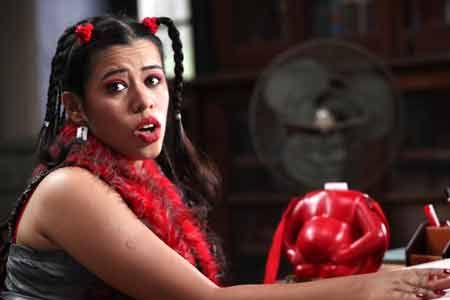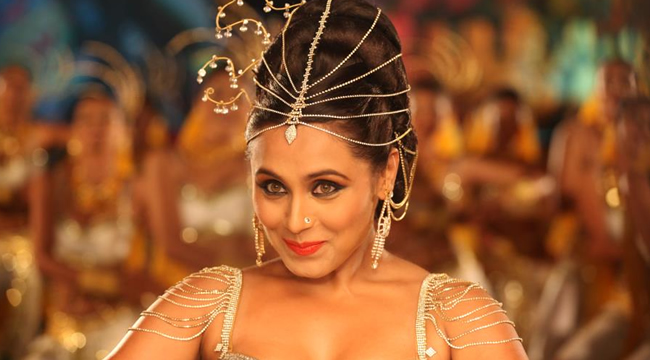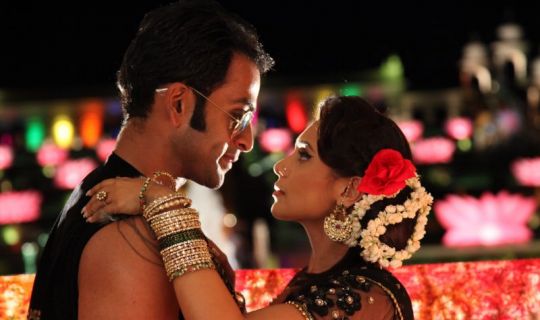 |
| Aiyyaa |
Guest post written by Rhea Daniel.
Aiyyaa shows how a perfectly loving Indian family, specifically a Marathi family (but this sort of traditionalism runs right across this arranged-marriage loving country so an Indian woman can relate) can make their female offspring miserable over the subject of her single-hood up to to the point where she’ll resort to taking any low-paying job as an excuse to stay out of home as long as she can. But leave home on her own terms she won’t, she needs a man first. She keeps fantasizing about packing up in the middle of the night, grabbing her mum’s gold jewellery and running away with her dream-man. Yes, she’s a romantic, a Bollywood fan and her ambitions extend thus far to falling in love and living HEA.
So why is this even feminist? I’ll explain:
Understanding the Arranged Marriage:
Speaking from my own observations, the concept of an arranged-marriage works well when the network of well-informed relatives can tell you what kind family you’re marrying your daughter/son into. This well-informed network will let you know if the family is traditional enough and boy isn’t of the wife-beating breed (that is if you care). Ancestral records are generally exchanged.
For the girl, if she’s marrying into an Indian family, she’s marrying the entire extended family of sisters, brothers, sils, bils, cousins, grandmas and grandpas, who feel they have a right freely express their opinion on your shape, colour, behaviour, job, hobbies, sexuality, dress sense, reproductive capabilities, domestic skills and also your parenting skills. This could happen to a triple PhD. or an aeronautical engineer, it don’t matter, because a brilliant career is only good to up one’s resume in finding the perfect mate of equal or more ped-degree. Smart people are generally expected to produce higher quality offspring. Yeah, however organized… this stuff gets intensely patriarchal. That’s why it’s okay if the entire family lands up at the dissecting table, not just the dude. Plus, it’s a good investment to have a Dil who’ll take good care of you when you’re old (another good reason to have at least one son). It’s archaic, but there you have it. Feelings can be manufactured.
Also, get ready to take on the roles Meenakshi’s already faking, you have very few moments to be yourself. Meenakshi dresses up seemingly voluntarily for the sit-downs, seems to be making an effort, but the audience knows that it’s an act. So why can’t she just say no, right? To understand why being in such a situation is like being stuck between a rock and a hard place take a look first at this fascinating TED talk by Sheena Iyengar on how Asians view choice:
I’ve come across people who are super-ready to marry whoever their parents choose for them, make their choice within an hour of meeting, marry within the week and go back to their jobs. I don’t really get it and I guess they have a great relationship with their parents, but the closest thing that explained it for me was this study by Sheena Iyengar. There’s no such thing as individual choice, there is only The Best Choice. While the system works well for the collective it wrecks havoc with individual desire. For some people stuck in this system it’s a leap in light-years to choose one’s own partner without the whole family acting like it’s criminal, or with threats that the family will fall apart of you do such a thing*. So
Meenakshi‘s parents put an ad in the newspaper to attract potential grooms. The sexism begins. The boy gets First Choice, the girl can be Convinced. As far as cultural imperatives go with boys, they need be good providers, (and reproduce capably, I suppose).
Sabotage:
Her parents are getting desperate. None of the boys like her, but then finally comes the nice boy who likes her within ten minutes of the meeting. He likes her crazy family too. She knows she’s fucked, because she’s not allowed to say no, so her only recourse is sabotage. She tries to drive him away with her singing. He likes her even more. He remembers to ask her whether she’s okay with it too, she doesn’t get the opportunity to answer, but the parents are ecstatic, even more reason not to open her mouth. Thanks to
the director for making this a hard decision for Meenakshi: her fiancé is incredibly nice, he respects her choices, he likes her the way she is. It’s the sort of
subtlety the directors of Brave failed to employ when creating their potential grooms. His only failure is his inability to tell that under that mask, she doesn’t really like him at all.
The Patriarchal Mother:
Meenakshi indulges a small rant that her mother laughs off as melodramatic. Don’t expect any sympathy from the Patriarchal Mother (a woman who subscribes willingly to patriarchal views), a daughter married off to a man her parents deem suitable only gives them a sense of continuity, they don’t consider their children’s lives separate from theirs, even if they suffer the same misery. “I did it too, it didn’t kill me” “You’re so selfish, he’s such a good boy!” “You’re mad!” are perfectly justifiable responses to a daughter’s unhappiness. Nobody in her family seems to get it, but then comes the only opposing voice from wheelchair-bound Grandma, who shouts: “Run away, Meenakshi, I couldn’t!”–when she makes a leap to freedom from the balcony of her fiancé’s house, providing a contrast to Meenakshi’s mother’s subservient simpering.
‘Man-hunting’**:
She falls for Surya, a Tamilian artist who visits the library she works in. She does her own version of the arranged-marriage research, asking people he’s acquainted with all sorts of questions about his personality etc. Her colleague informs that he is rumoured to drink and do drugs, that’s why his eyes are so red, but it doesn’t faze her. She tries to find out more about his culture. She’s advised to watch Tamil movies. She learns the language, beginning with sexually suggestive compliments, learning how to say “please leave your shirt button open” in Tamil. She goes dreamy-eyed every time he passes and swoony over his after-shave (or body-odour, whatever it is). It might help to know that the entire movie is the based on one of stories from the Marathi movie Gandha (2009) (translated to ‘smell’ or ‘fragrance’) by the same director. Meenakshi seems sensitive to any noxious type smells. Her olfactory sense seems to be her love-guide. She hates the smell of the college toilets, but there’s a scene where she trance-walks into the men’s loo because she can smell Surya in there. Lucky for Surya he was just washing his face. Imagine someone standing outside your toilet cubicle smelling your farts.
Anti-feminism:
While the research she does is justifiable, the stalking is not. Granted, she’s shy and he treats her like wallpaper, even when she tries speak to him directly in Tamil (we find out later he’s doing this deliberately) so she has to find other means to approach him. As the day of her engagement draws closer she grows more and more desperate to see in him an ideal partner, so her investigation leads her down some unsavoury roads. She then escapes her home on the eve of her engagement and follows him to his incense stick factory (that’s why he smells so good), finds out he’s not such a bad dude, and his eyes are so red because of the incense fumes. He finally confronts her, knows she’s been following him, says he likes her guts and wants to marry her. There’s another cute scene where they happily share their mutual academic failures. I know the stalking’s a play on role-reversal considering Bollywood’s long history of
stalking-as-romance, many girls and women are victims of this imitative ‘romance’ in real life, but entering his home under false pretences and stealing his t-shirt crosses a line, even though she is portrayed as harmless. Stalking is a recourse in a society where there is firm divide between the sexes, and it’s one of the primary things that has to go with archaic notions of love and romance, boy or girl. In this movie Surya knowingly strings her along to see how far she’ll go. Very well, but the sooner we get to
enthusiastic consent or polite decline (and acceptance), the better for both parties.
 |
| Anita Date as Maina in Aiyyaa |
I don’t care if Meenakshi’s librarian-colleague Maina is an an exaggerated comic-relief character, I found her funny. I couldn’t find much on
Anita Date, the actress who plays her. She serves as advisor to Meenakshi, encouraging her to marry Maadhav, because he’s good ‘husband material’ and later on have an affair with Surya. Meenakshi prefers to go by the direct route. Poor
Maadhav, her fiancé, gets the raw end of the deal when she lands up at her own engagement ceremony with her preferred love Surya. He takes the rejection sorrowfully but gracefully, and refuses her patronizing offer to remain ‘just friends’. In the midst of all the madness director Kundalkar gives his minor characters their dignity.
Despite this movie’s sprinkling of annoying Bollywood fantasy numbers (which I skipped) and occasional mind-numbingly loopy, loud scenes, most of it was gratifyingly funny. In Meenakshi’s declaration of love for dark people (technically what she says translates to “I don’t like light-skinned people, I like black people”) she’s referring to her love for South-Indian Surya, but it comes across as a taunt to the Indian majority that views ‘fairness’ as as a prerequisite for attractiveness. The only incongruity of this statement is that Malayali actor Prithviraj doesn’t qualify as ‘dark’ by any Indian standard, so it makes her declaration specific to his race (South-Indians are stereotyped as dark-skinned) and her willingness to integrate with them. Dreamum-wakuppam, a parodied version of South-Indian dance numbers (not to mention the language) can seem insulting at first***, but by the end of the movie she’s transformed into a traditional Tamil bride, and speaks Tamil like she can’t help it. Her exclamations of ‘aiyyaa!’ change into the South-Indian ‘aiyyoo!’ Having visited a traditional Marwari household in Pondicherry and Gujarati household in Chennai who regularly feast on idli–dosa made by their super-traditional sari-clad wives, I’d believe the integration is not just for survival, it’s embraced.
I know that wives have cheated on their husbands in Bollywood before, I know they’ve also shown cheating husbands the door, but these stories have remained distant scandals before. Caught between one’s desire for freedom and one’s cultural call of doody ie., to marry and reproduce, is a common cross to bear in this country, and I’ve never come across a Bollywood movie that didn’t conveniently villainize the parents/society in order to dramatize the girl or boy’s situation. So despite all the mayhem Ayyiaa manages to make itself a predominantly feminist film, and had some subtle observations to make that shone like little jewels through the script.
*Preferring to remain single is an alien concept, let’s not even go there.
**Didn’t really like the way that was advertized, man-hunting seems to refer to a search ranging across several men, when she quite obviously interested only in The One.
***I thought it was hilarious.
———-
Rhea Daniel got to see a lot of movies as a kid because her family members were obsessive movie-watchers. She frequently finds herself in a bind between her love for art and her feminist conscience. Meanwhile she is trying to be a better writer and artist and you can find her at http://rheadaniel.blogspot.com/.




